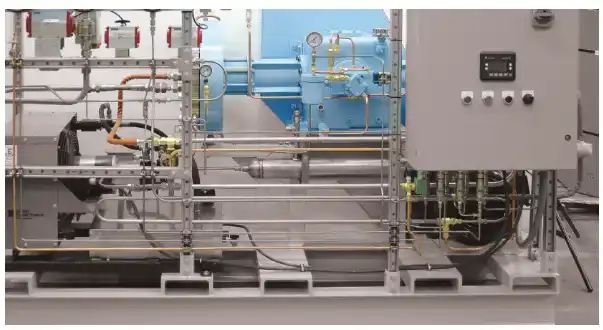Types of compressors used in H2 refueling
Several types of compressors are utilized in hydrogen refueling stations, each with its own advantages and applications. The choice of compressor technology can significantly impact the efficiency and reliability of the fueling process.
Reciprocating compressors
Reciprocating compressors are widely used in hydrogen fueling stations due to their ability to achieve high compression ratios. These compressors use pistons to compress the hydrogen gas, making them suitable for handling the high pressures required in hydrogen fueling. TSC, a brand of CM Energy, incorporates advanced reciprocating compressor designs in their hydrogen fueling solutions to ensure optimal performance.
Diaphragm compressors
Diaphragm compressors offer excellent gas purity and leak-tight operation, which is crucial when handling hydrogen. These compressors use a flexible diaphragm to compress the gas, eliminating the need for seals that could potentially leak. This design makes them particularly well-suited for hydrogen applications where contamination must be avoided at all costs.
Ionic liquid compressors
Ionic liquid compressors represent an innovative approach to hydrogen compression. These compressors use ionic liquids to compress hydrogen gas, offering potential advantages in efficiency and reduced mechanical wear. While still in the early stages of commercial deployment, ionic liquid compressors show promise for future Hydrogen Fueling Station applications.
Pressure management challenges in hydrogen storage
Managing pressure in hydrogen storage systems presents unique challenges that require careful consideration and specialized equipment. These challenges stem from hydrogen's properties and the high pressures involved in fuel cell vehicle refueling.
Material compatibility issues
One of the most significant challenges in hydrogen pressure management is ensuring material compatibility. Hydrogen, due to its small molecule size, can cause embrittlement in certain metals, which weakens their structure and makes them more prone to cracking and failure. This can be particularly problematic in high-pressure environments such as storage tanks and piping systems, where the risk of catastrophic failure increases. To mitigate this issue, manufacturers of hydrogen fueling stations must carefully select materials that are resistant to hydrogen-induced embrittlement. Advanced alloys and composite materials are often chosen for their ability to withstand prolonged exposure to hydrogen, ensuring the safety and longevity of fueling systems.
Temperature control during compression
Compressing hydrogen generates heat, which can affect the fueling process and the integrity of storage systems. Effective cooling systems are essential to maintain safe operating temperatures and ensure consistent fuel delivery. TSC's hydrogen fueling solutions incorporate advanced thermal management techniques to address this challenge. By utilizing cooling systems that effectively dissipate the heat generated during hydrogen compression, fueling stations can maintain safe operating temperatures. These cooling systems not only protect the equipment but also ensure a consistent and reliable fueling process for vehicles, reducing the risk of fuel delivery inconsistencies and improving the overall efficiency of the station.
Leak detection and prevention
Given hydrogen's small molecule size, preventing and detecting leaks is critical for safe operation. Hydrogen fueling stations require sophisticated monitoring systems and specialized sealing technologies to maintain system integrity. CM Energy's hydrogen fueling equipment features state-of-the-art leak detection systems to ensure safe and reliable operation.
Innovations in compressor technology for safer fueling
As the hydrogen economy continues to grow, innovations in compressor technology are driving improvements in safety, efficiency, and reliability of hydrogen fueling stations. These advancements are crucial for the widespread adoption of hydrogen as a clean energy carrier.
Advanced sealing technologies
New sealing technologies are being developed to minimize the risk of hydrogen leaks in compressor systems. These innovations include advanced materials and design configurations that provide superior leak resistance even under high-pressure conditions. TSC incorporates these cutting-edge sealing solutions in their hydrogen compressors to enhance safety and performance.
Intelligent monitoring and control systems
Modern Hydrogen Fueling Station compressors are equipped with sophisticated monitoring and control systems. These intelligent systems can detect anomalies in real-time, adjust operating parameters for optimal performance, and initiate safety protocols when necessary. CM Energy's hydrogen fueling solutions feature advanced control systems that ensure safe and efficient operation under various conditions.
Oil-free compression technologies
Oil-free compressor designs are gaining traction in hydrogen fueling applications. These systems eliminate the risk of oil contamination in the hydrogen stream, ensuring the purity of the fuel delivered to vehicles. By removing the need for oil lubrication, these compressors also reduce maintenance requirements and improve overall system reliability.
Call to Action: Choose CM Energy for Advanced Hydrogen Fueling Solutions
As a leader in hydrogen energy equipment and innovative fueling solutions, CM Energy offers state-of-the-art Hydrogen Fueling Station technology through our TSC brand. Our customized equipment packages and EPC services feature advanced compressor systems, intelligent control modules, and high-performance dispensers designed to meet the demanding requirements of modern hydrogen infrastructure. With a focus on safety, efficiency, and reliability, CM Energy's hydrogen fueling solutions are driving the transition to a cleaner, more sustainable energy future. Experience the difference of our cutting-edge technology and comprehensive support services. Contact us today at info.cn@cm-energy.com to learn how we can help you build or upgrade your hydrogen fueling infrastructure.

